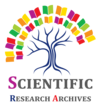Novel Genomic Variants Sars-Cov-2 and blood glucose in the post-pandemic period: Retrospective epidemiology study
1 Department of Sciences Medicine, All Lab World Medical Clinic, Presidente Vargas, 529 - Centro, Rio de Janeiro, Brazil.
2 Department of Health and Agricultural Sciences, Santa Úrsula University, Fernando Ferrari, 75 – Botafogo, Rio de Janeiro, Brazil.
3 Tropical Medicine, Vector Medical Malacology lato sensu postgraduate, Oswaldo Cruz Institute, Oswaldo Cruz Foundation, Avenida Brazil 4.365 – Manguinhos, Rio de Janeiro, Brazil.
4 Pharmacy Department, Celso Lisboa University Centre, Rio de Janeiro, Brazil.
5 Nursing Department, Celso Lisboa University Centre, Rio de Janeiro, Brazil.
6 Biomedicine Department, Celso Lisboa University Centre, Rio de Janeiro, Brazil.
International Journal of Science and Technology Research Archive, 2025, 08(01), 059-068
Article DOI: 10.53771/ijstra.2025.8.1.0022
Publication history:
Received on 12 December 2024; revised on 04 February 2025; accepted on 07 February 2025
Abstract:
Coronavirus disease 2019 (COVID-19) is a highly infectious illness caused by the acute respiratory syndrome coronavirus 2 (SARS-CoV-2) which started in China in December 2019 and rapidly spread across the world became the pandemic disease of the 21st century. Diabetes is a known risk factor for mortality in Coronavirus disease 2019 (COVID-19) patients. SARS-CoV-2 infects peripheral blood monocytes and enhances the expression of angiotensin-converting enzyme 2 (ACE2). We conducted this study to evaluate the impact of glucose morbidities on several events in COVID 19. Thus, the main of this study is to detect the presence of glucose levels in the post-pandemic period, as diabetic people have a higher risk of developing severe illness from COVID-19. This is a retrospective epidemiology study involving patients categorized into three groups to admission Blood Glucose (BG) levels: < 70 mg/dL; 77 – 90 mg/dL; < 99 mg/dL according to standard glycaemic targets in the post pandemic period among 2023 and 2023 y. It was carried out the tracking of 19 genomic variants by accessible via GISAID EpiCoV. About 110 countries shared 25,321 GRA (BA.2.86+BA.2.86.*) genome sequences from sample collection to making these data publicly. Therefore, further studies are needed to better be understanding of measurement in diabetic patients at high risk for COVID-19. New insulin therapy or increased dosing from baseline had not been considered. Genomic tools as Next Generation Sequencing (NGS) for the characterization of viral samples and in genetic engineering for the development of vaccines had been advanced molecular studies during SARS-CoV-2 pandemic.
Keywords:
Blood glucose; COVID-19; Diabetes; Genomic variants; SARS-CoV-2
Full text article in PDF:
Copyright information:
Copyright © 2025 Author(s) retain the copyright of this article. This article is published under the terms of the Creative Commons Attribution Liscense 4.0
